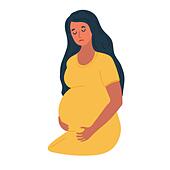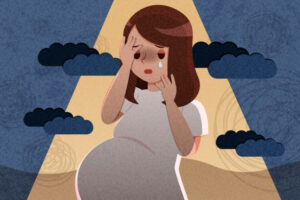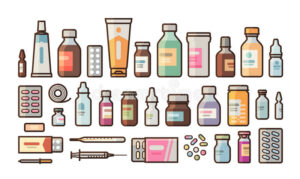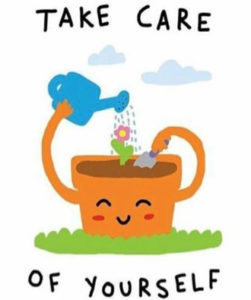Depression and Pregnancy are two topics that are often not talked about enough. Pregnant women need to be aware of the signs and symptoms of depression, as well as the treatments available to them. Depression can hurt both the mother and the baby, so it is important to get help if you are feeling depressed. In this blog post, we will discuss depression and pregnancy in more detail. We will talk about the signs and symptoms of depression, as well as the treatments available to pregnant women. We hope that this information will help expecting mothers get the help they need!
Contents
Depression And Pregnancy
Pregnancy has a lot of changes in your body. The stressors caused by these transitions can result in you being depressed during pregnancy. This emotional shift may have an impact on how you feel about yourself and the world around you. If you are feeling sad, it is important to seek help from a healthcare professional because it is curable. Women who have depression during pregnancy are also at a higher risk of developing postpartum depression. Depression is as prevalent among pregnant women as it is in non-pregnant females. This ailment can strike at any time, whether you’re expecting it or not.
Signs Of Depression During Pregnancy
- Thoughts about dying or suicide are frequent.
- Terrible mood for most of the day, almost early in the day.
- Guilt, despair, and worthlessness
- Problems with thinking, concentrating, or making judgments.
- Loss of interest or pleasure in almost daily activities nearly every day.
These are some commonly visualized signs of a pregnant woman suffering from depression. Seek treatment at the right time unless it gets too late.
Risk Elements
Numerous elements may raise your risk of suffering from depression throughout pregnancy. These hazards might include:
- If you or someone in your family has a history of depression or premenstrual dysphoric disorder (PMDD).
- Your age at the time of conception has a lot to do with it. The younger you are, the greater your chance of having a baby with Down syndrome.
- Living Alone most of the time.
- Inadequate social support.
- You’re unhappy, miserable, and angry,
- You miss your partner extremely.
- You’re unsure about your pregnancy.
The above-mentioned are the major causes that may lead to depression during pregnancy. If not cured at the right time, the situation may get worse.
Does Pregnancy Cause Depression?
Depression can occur during pregnancy. Pregnancy is a time of significant change for your body, which might lead to depression in some individuals. Not everyone who gets pregnant will become depressed.
If you’ve had depression in the past, it might return or if you were already suffering from it while pregnant, your symptoms may worsen. It’s critical to chat with your doctor about depression during pregnancy since it can last after the baby is born. Women who are depressed while they’re pregnant are more likely to suffer from postpartum depression (depression following childbirth).
How Does Depression Affect Pregnancy?
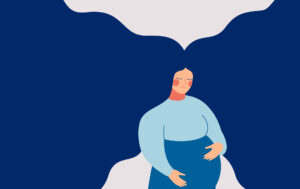 Pregnancy can be a difficult time for both mother and child. During pregnancy, experiencing depression can have an impact on a woman’s health in several ways. Depression throughout pregnancy might have the following effects on you:
Pregnancy can be a difficult time for both mother and child. During pregnancy, experiencing depression can have an impact on a woman’s health in several ways. Depression throughout pregnancy might have the following effects on you:
- Giving Up Self Care: It’s vital to look after your health throughout pregnancy. Depression tries to persuade you to give up on caring for yourself. It may make you neglect your own needs. You could be less inclined to follow medical instructions if you’re depressed during pregnancy, as well as sleep and eat properly.
- Use Of Harmful Substances: You increase your chances of using hazardous chemicals. Tobacco, alcohol, and illicit drugs are all examples of such items. You can turn to these medications if you’re depressed, which might have a detrimental impact on your pregnancy.
- Emotional Disconnect: It also Interrupts your ability to connect with your growing child. While your baby is in the womb (uterus), he or she can hear you talk and understand emotion from the tone, rhythm, and stress of your voice. You could have a hard time establishing this bond with your kid if you are depressed during pregnancy. You may feel emotionally cut off.
Pregnancy is an amazing time, and it’s worth getting the support you need to enjoy it to the fullest extent. Depression during pregnancy is a serious issue that should be addressed by a medical professional. If you are experiencing depression, don’t hesitate to reach out for help.
Remedies
If depression during pregnancy is affecting your quality of life, it’s important to seek the required solutions at the right time. There are many effective treatments for depression during pregnancy, including therapy, medication, and self-care.
Therapies
Your healthcare provider can help you create a treatment plan that’s right for you. He can also provide you with soothing therapies like massage, aromatherapy, and others. The common therapies are:
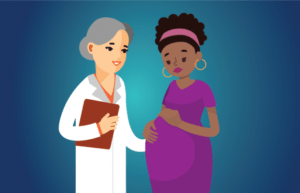
- Cognitive-Behavioral Therapy: This therapy helps you change your negative thinking patterns and teaches you how to better deal with stress. During pregnancy, this therapy can help you cope with depression, anxiety, and sleep problems.
- Interpersonal Therapy: This therapy focuses on your relationships with others and how they affect your mood. It can help you build better communication skills and resolve conflicts. This is especially helpful if depression is caused by or worsened by relationship problems. During pregnancy, this therapy will help you build a support network.
- Psychotherapy: This therapy is a more general form of treatment that helps you understand and work through your emotions. It can help you identify the root causes of your depression and develop coping mechanisms. During pregnancy, this therapy will help you deal with depression, anxiety, and stress.
- Massage: Massage therapy is a great way to relieve stress and tension. It can also help improve circulation and reduce swelling which will help you overcome your depression during pregnancy.
- Aromatherapy: Aromatherapy uses essential oils to promote relaxation and well-being. The most popular essential oils for depression are lavender, chamomile, and jasmine.
Medication
If depression is severe, your healthcare provider may prescribe you medication. Antidepressants are safe for most women, but there are a few exceptions. If you’re considering medication for depression, be sure to talk to your healthcare provider about the potential risks and benefits. Some medications are:
- Selective serotonin reuptake inhibitors (SSRIs): These are the most commonly prescribed type of antidepressants. They include medications such as fluoxetine (Prozac), paroxetine (Paxil), and sertraline (Zoloft).
- Serotonin and norepinephrine reuptake inhibitors (SNRIs): These medications are similar to SSRIs, but they affect both serotonin and norepinephrine. Examples include venlafaxine (Effexor XR) and duloxetine (Cymbalta).
- Tricyclic antidepressants: These older medications tend to have more side effects than other types of antidepressants. But they may be an option if other medications haven’t worked. Examples include amitriptyline and nortriptyline (Pamelor).
If you take medication for depression during pregnancy, you may worry about the risks to your baby. But it’s important to remember that the risks of untreated depression are also serious. If you have depression and are thinking about getting pregnant, talk to your healthcare provider about the best way to manage your depression.
Self-Care Tips
Self-care is also an important part of managing depression during pregnancy. There are many things you can do to take care of yourself, including exercise, relaxation techniques, and healthy eating. When depression is severe, self-care can be difficult. But even small changes can make a big difference. Taking care of yourself physically can help improve your mood and control symptoms of depression. Some useful tips to avoid depression during pregnancy are:
Get Enough Sleep
Getting enough sleep will help you reduce your depression during pregnancy. It is important to get at least eight hours of sleep every night. First, when you’re well-rested, you have more energy to take on the day. This can be helpful if depression is making it hard to get motivated. Secondly, sleep helps regulate hormones in the body. This is important because hormonal changes contribute to depression during pregnancy. Finally, getting enough sleep boosts your mood and helps improve your overall mental health. Getting enough rest is essential for both you and your baby’s health.
Take Breaks
It is very important to take breaks from work or from taking care of the house. For many women, becoming pregnant can be an extremely stressful time. If you’re constantly thinking about the pregnancy, it can be easy to become overwhelmed and depressed. Taking breaks throughout the day will help you to take your mind off of things and relax for a bit. It doesn’t have to be anything major – just a few minutes here and there to clear your head.
Eat Healthy And Balanced Meals
Eating healthy foods will help you reduce your depression during pregnancy. It is very important to eat a balanced diet and to avoid processed foods. Eating nutritious foods helps to decrease depression symptoms and provides the energy needed to care for a growing baby. Include plenty of fruits and vegetables in your diet. Fruits and vegetables are packed with nutrients that are essential for both you and your baby. Choose whole-grain bread and cereals. Whole grains are a good source of fiber, which can help to keep you feeling full and reduce depression symptoms. Get adequate protein. Protein is needed for the growth and development of your baby. Good sources of protein include lean meats, beans, and eggs. Drink plenty of water. Staying hydrated is important for both you and your baby.
Exercise Regularly
It is very important to get at least 30 minutes of exercise every day. There are many benefits to exercising regularly during pregnancy, and one of them is that it can help decrease depression. Exercise releases endorphins, which have mood-boosting effects. It also helps improve sleep, gives you more energy, and can help reduce stress levels. All of these things can lead to a decrease in depression symptoms.
Avoid Alcohol And Drugs
There are a few key reasons why alcohol and drugs should be avoided during pregnancy, especially when depression is present. For one, alcohol and drugs can worsen depression symptoms. Additionally, they can also lead to other problems such as Fetal Alcohol Syndrome (FAS) or Neonatal Abstinence Syndrome (NAS). Finally, using substances during pregnancy puts both the mother and child at risk for a host of health complications. Therefore, it’s best to avoid them altogether, If you’re struggling with depression and pregnancy.
Connect With Friends And Family Members
Finally, spending time with friends and family can be a great way to combat depression. Whether you have a girls’ night in or go out for dinner, quality time with the people you love can help to improve your mood. If you’re struggling with depression during pregnancy,
Seek Support Groups For Pregnant Women
You may also want to consider talking to a depression support group. This can be a great way to connect with other women who are dealing with similar issues. Talking to others who understand what you’re going through can be very helpful.
Speak To Your Doctor
Depression during pregnancy is a serious issue that expecting mothers need to be aware of. It’s important to speak to your doctor about any depression symptoms you may be experiencing, as they can help you manage them and get the treatment you need.
There are several reasons why speaking to your doctor about depression can reduce its severity and help you better manage it. Some of the reasons are: Your doctor can help you identify the signs and symptoms of depression, he can provide you with information about depression and how it may affect your pregnancy, you can get support and guidance throughout your pregnancy, and your doctor can connect you with resources and services that can help you manage depression during pregnancy.
Get Some Fresh Air
Even if you just step outside for a few minutes, it can help to improve your overall outlook on life. First, being outdoors can help to increase your levels of vitamin D. Vitamin D is important for overall health, but it can also help to improve mood and reduce stress levels. Additionally, spending time in nature can help to ground you and provide a sense of calm. And finally, fresh air can simply give you a much-needed break from the hustle and bustle of everyday life. If you’re feeling depressed during pregnancy, make sure to get plenty of fresh air each day. Just a few minutes spent outdoors can make a big difference in your mood and well-being.
These are some beneficial self-help strategies to cope with depression during pregnancy. If practiced with the right strategy, one can get rid of this difficulty in the most beautiful phase of life.
Conclusion
At last, at the end of this blog, it is included that depression and pregnancy are two-faced a coin. It is very important to get the depression out of your system before getting pregnant. A happy mother means a healthy and happy baby. So, keep yourself positive and always think about the good things in life. Be surrounded by people who make you laugh and forget about your depression. Get help from professionals if you can’t seem to do it on your own. Lastly, don’t forget that you are not alone in this battle against depression. Fortunately, there are lots of people out there who want to help. So please, do not hesitate to ask for help. After all, your depression does not only affect you but also your baby. Therefore, mother and baby should be depression free for a happy and healthy life.
For more information, please contact MantraCare. Depression is a mental illness characterized by persistent feelings of sadness, hopelessness, and loss of interest in daily activities. If you have any queries regarding Online Depression Counseling experienced therapists at MantraCare can help: Book a trial Depression Therapy session

